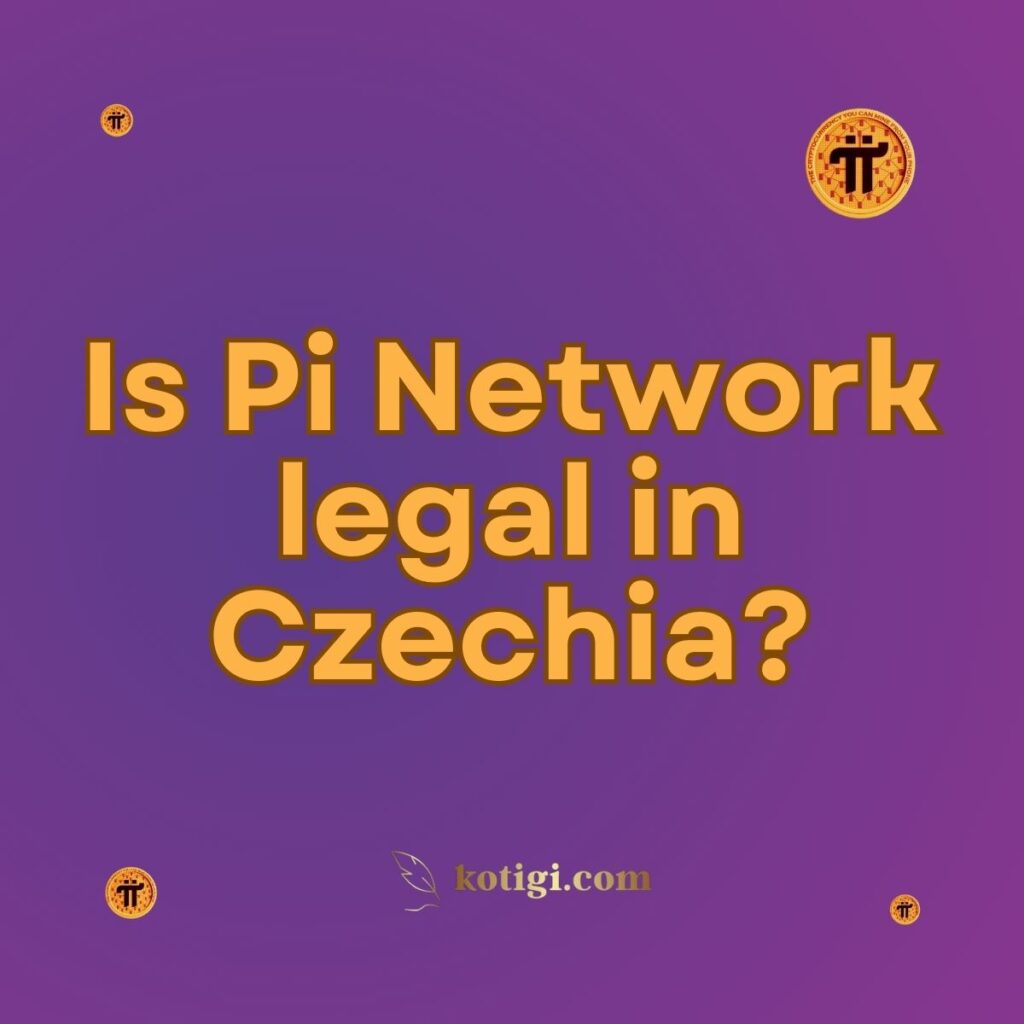
Is Pi Network legal in Czechia?
Yes, Pi Network is legal in Czechia. The country has no specific laws prohibiting its use, but users are required to comply with the nation’s existing cryptocurrency regulations, including taxation and anti-money laundering (AML) requirements. Participation in Pi Network is allowed as long as users adhere to these rules.
Introduction
As the global adoption of cryptocurrencies expands, one common question arises: “Is Pi Network legal in my country?” In Czechia, the regulatory environment for cryptocurrencies is generally permissive, with the country showing increasing openness toward digital currencies and blockchain technology. Pi Network, with its growing user base, is one such cryptocurrency that has drawn attention from Czech users eager to participate in this innovative space.
This article explores the legality of Pi Network in Czechia, delving into the country’s regulatory approach to cryptocurrencies, user obligations, and the key legal factors that Pi users must consider. By understanding the Czech regulatory landscape, users can confidently participate in Pi Network while remaining compliant with national laws.
Cryptocurrency Regulations in Czechia
Czechia’s General Approach to Cryptocurrencies
Czechia has taken a relatively open stance toward cryptocurrencies like Pi Network. Cryptocurrencies are not officially recognized as legal tender, but they are considered legal assets that can be used for transactions, investment, and other activities. The country has not implemented any specific bans or restrictions on the use of cryptocurrencies, making Pi Network legally accessible to its citizens.
However, while the government does not impose direct prohibitions, cryptocurrencies are subject to existing financial and legal regulations. This includes ensuring that cryptocurrency activities comply with anti-money laundering (AML) laws, taxation requirements, and consumer protection guidelines.
Oversight by the Czech National Bank (CNB)
In Czechia, the Czech National Bank (CNB) plays a key role in overseeing financial markets, including the use of digital currencies like Pi Network. Although the CNB has not issued specific regulations targeting Pi Network, it is responsible for ensuring that all financial activities within the country, including cryptocurrency transactions, follow the appropriate legal frameworks.
The CNB has clarified that while cryptocurrencies are not considered traditional financial instruments, they fall under the category of assets subject to general financial and tax regulations. Users of Pi Network are therefore expected to adhere to these rules, which include paying taxes on cryptocurrency gains and complying with AML regulations.
Anti-Money Laundering (AML) and Know Your Customer (KYC) Compliance
AML Regulations in Czechia
Czechia’s approach to anti-money laundering (AML) regulations includes applying these standards to cryptocurrency platforms, including Pi Network. The country’s AML laws aim to prevent illegal activities, such as money laundering and terrorist financing, through the use of financial assets, including digital currencies.
While Pi Network operates as a decentralized platform, its users must still adhere to Czech AML laws, which require cryptocurrency platforms to implement processes that prevent illegal activities. To align with these requirements, Pi Network uses a Know Your Customer (KYC) process to verify the identity of its users before they can access certain features or transfer Pi tokens.
The Role of KYC in Pi Network
Pi Network’s KYC process is designed to ensure that all participants are legitimate users, helping prevent fraud and other illegal activities. In Czechia, this KYC process is crucial for complying with AML regulations and ensuring the integrity of the platform.
For Pi Network users in Czechia, completing the KYC process not only unlocks full access to the network but also ensures compliance with Czech laws. This process is an essential safeguard, ensuring that the platform remains legal and operates in accordance with the country’s financial laws.
Taxation of Cryptocurrencies in Czechia
How Cryptocurrency Gains Are Taxed
In Czechia, the use of cryptocurrencies is taxable, and this includes activities related to Pi Network. Cryptocurrency gains, whether from mining, trading, or exchanging, are considered taxable income and must be reported to the Czech tax authorities.
For now, Pi Network is in the pre-mainnet phase, and Pi tokens do not have a tradable value. However, once Pi tokens gain value and become tradable, users will be required to report any profits they make from mining or selling these tokens. Czech citizens participating in Pi Network need to stay informed about the evolving tax obligations as the network progresses.
Reporting Cryptocurrency Transactions
Czech tax authorities expect individuals who generate income from cryptocurrencies, including Pi tokens, to report their gains. Users who mine, sell, or exchange Pi tokens will need to calculate their profits and declare them in their tax filings. Failure to comply with tax obligations can lead to penalties or fines, so it is crucial for Pi users in Czechia to keep accurate records of their cryptocurrency activities.
Legal Considerations for Pi Network Users in Czechia
Financial Risks of Participating in Pi Network
Like any cryptocurrency, Pi Network comes with inherent financial risks. As of now, Pi tokens do not have a tradable value, but when they do, their value could fluctuate based on market conditions. For users in Czechia, it’s essential to recognize the potential volatility of Pi tokens and the possibility of financial losses.
Moreover, Pi Network is still in its early stages, and there are uncertainties regarding its long-term success. Users should be cautious about investing time and resources into the network without a clear understanding of its future trajectory. While Pi Network offers exciting possibilities, it’s essential to consider the financial risks before fully committing.
Potential Regulatory Changes
While Czechia’s regulatory environment is currently flexible, future legal changes could affect how Pi Network operates in the country. Cryptocurrencies are still relatively new, and as the market evolves, Czech lawmakers may introduce more specific regulations to address concerns related to fraud, consumer protection, or taxation.
Pi Network users should stay informed about any potential changes in Czech laws that could impact their ability to use, trade, or mine Pi tokens. Regulatory shifts could also affect the taxation of cryptocurrencies, so users must ensure they remain compliant with any updates.
The Role of Blockchain in Czechia
Blockchain Technology Adoption in Czechia
Czechia is gradually becoming a hub for blockchain technology and cryptocurrency adoption. The country is home to several blockchain startups, and government institutions are exploring the use of blockchain for various applications, such as improving transparency in public administration.
Pi Network, as a decentralized platform built on blockchain technology, fits into the broader landscape of innovation within Czechia. While Pi is not yet fully operational in terms of its mainnet, the potential for integration with the country’s growing blockchain sector exists.
Pi Network’s Potential in the Czech Blockchain Ecosystem
As blockchain becomes more widely adopted in Czechia, platforms like Pi Network could play an increasingly important role in the country’s digital economy. Pi Network’s focus on creating a user-friendly and decentralized platform aligns well with the country’s vision of fostering technological innovation while maintaining compliance with regulatory frameworks.
By staying informed about developments in the Czech blockchain space, Pi users can better understand how the platform fits into the country’s digital future.
Conclusion
In conclusion, Pi Network is legal in Czechia, and there are no laws explicitly prohibiting its use. However, users must comply with the country’s existing cryptocurrency regulations, including tax obligations and anti-money laundering (AML) requirements. Completing the KYC process is essential for Pi Network users in Czechia to ensure that they are operating within the legal framework.
While the regulatory environment in Czechia is currently permissive, it is important to stay informed about potential legal changes that could affect how Pi Network is used. As Pi Network matures and its tokens gain value, Czech users will need to consider the tax implications of their activities and ensure they remain compliant with evolving financial laws.
Czechia’s openness to blockchain technology makes it an ideal environment for platforms like Pi Network to thrive. However, users must exercise caution, remain compliant with regulations, and stay up to date on any changes in the legal landscape to avoid any risks.
Key Takeaways
- Legal Status: Pi Network is legal in Czechia, and there are no specific prohibitions on its use.
- AML and KYC Requirements: Users in Czechia must complete the KYC process and comply with anti-money laundering (AML) regulations.
- Tax Obligations: Cryptocurrency gains, including future Pi token profits, are taxable, and users must report their income to Czech tax authorities.
- Financial Risks: As Pi tokens gain value, users should be aware of the potential financial risks and market volatility.
- Regulatory Environment: Czechia’s regulatory stance on cryptocurrencies is flexible, but users should monitor potential future changes in the law.
- Blockchain-Friendly: Czechia’s openness to blockchain innovation provides a supportive environment for Pi Network to grow.




